An Examination of Modern Slavery in the Apparel Industry Supply Chain
VerifiedAdded on 2021/05/17
|10
|2196
|410
Report
AI Summary
This report provides a comprehensive analysis of modern slavery within the apparel industry supply chain. It begins with an introduction to the problem, defining modern slavery and its prevalence, particularly in the context of forced labor. The report then reviews existing literature on the topic, exploring various perspectives and theories related to the issue. An evaluation of company performance against stated targets and legal obligations is included, examining how businesses are addressing modern slavery concerns. The analysis delves into relevant legal frameworks, such as the Modern Slavery Act, and assesses the effectiveness of company actions. The study concludes with a summary of key findings, emphasizing the importance of supply chain sustainability and the potential reputational and financial implications of modern slavery. The report highlights the role of international inspection and testing firms in mitigating risks and ensuring ethical practices.
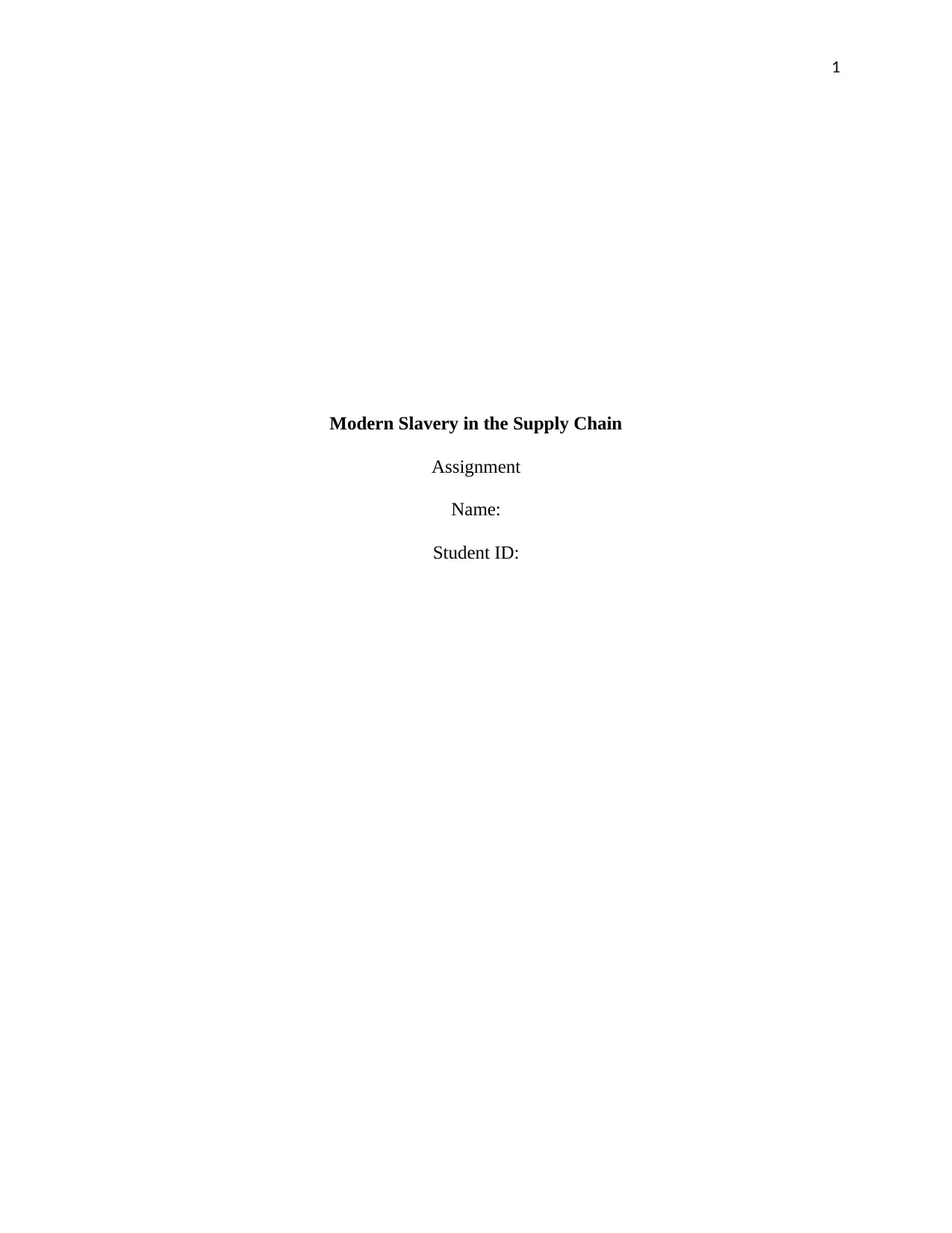
1
Modern Slavery in the Supply Chain
Assignment
Name:
Student ID:
Modern Slavery in the Supply Chain
Assignment
Name:
Student ID:
Paraphrase This Document
Need a fresh take? Get an instant paraphrase of this document with our AI Paraphraser
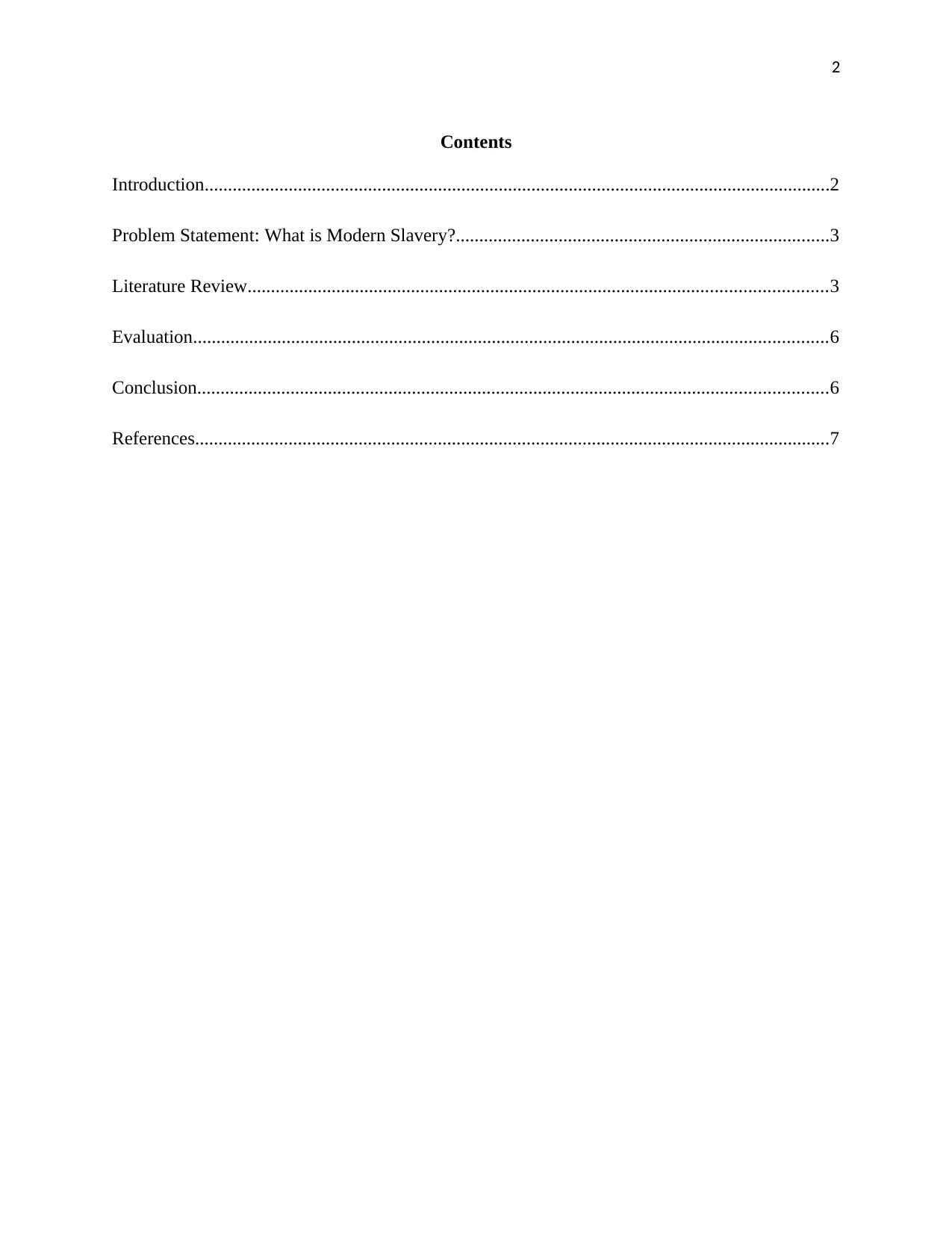
2
Contents
Introduction......................................................................................................................................2
Problem Statement: What is Modern Slavery?................................................................................3
Literature Review............................................................................................................................3
Evaluation........................................................................................................................................6
Conclusion.......................................................................................................................................6
References........................................................................................................................................7
Contents
Introduction......................................................................................................................................2
Problem Statement: What is Modern Slavery?................................................................................3
Literature Review............................................................................................................................3
Evaluation........................................................................................................................................6
Conclusion.......................................................................................................................................6
References........................................................................................................................................7
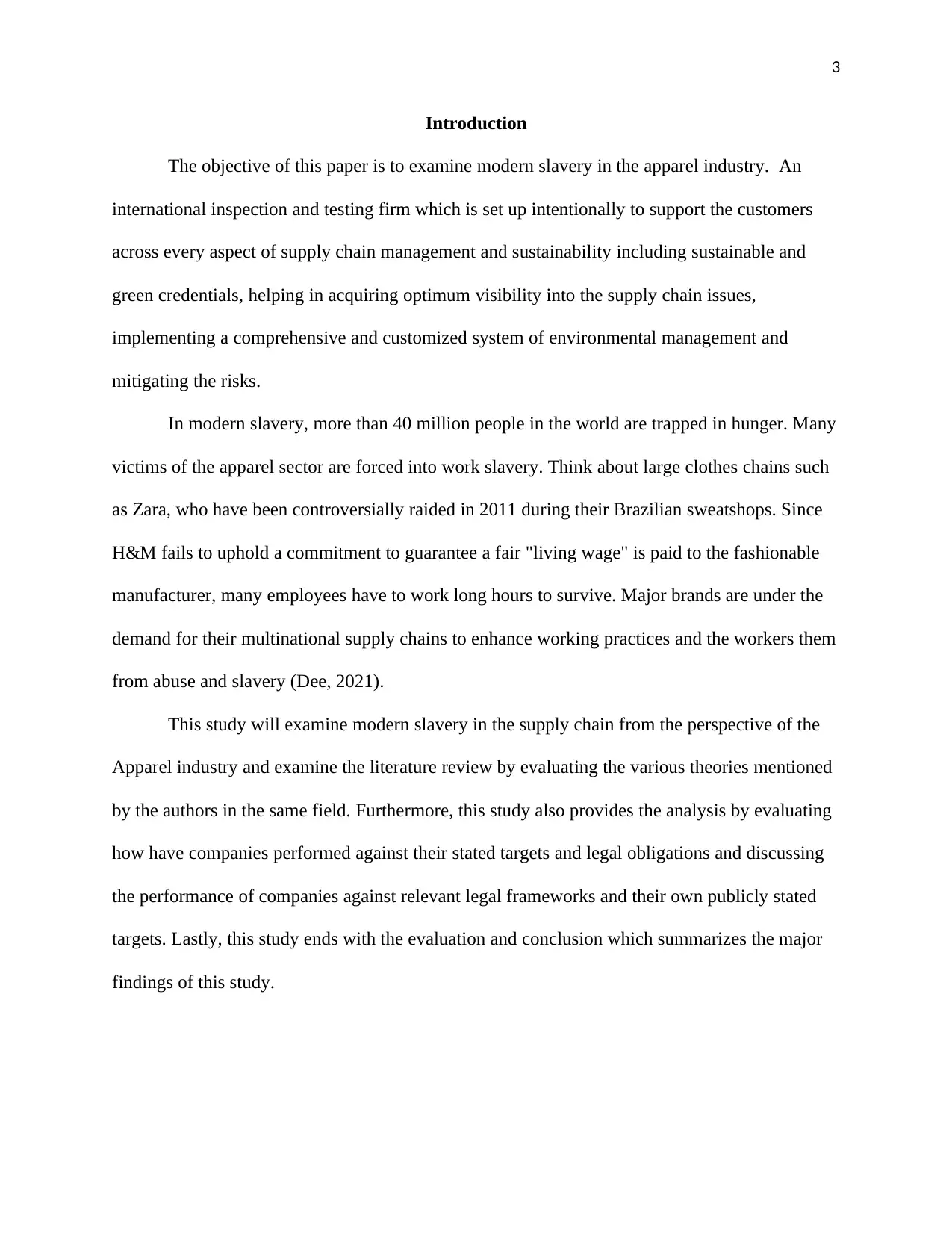
3
Introduction
The objective of this paper is to examine modern slavery in the apparel industry. An
international inspection and testing firm which is set up intentionally to support the customers
across every aspect of supply chain management and sustainability including sustainable and
green credentials, helping in acquiring optimum visibility into the supply chain issues,
implementing a comprehensive and customized system of environmental management and
mitigating the risks.
In modern slavery, more than 40 million people in the world are trapped in hunger. Many
victims of the apparel sector are forced into work slavery. Think about large clothes chains such
as Zara, who have been controversially raided in 2011 during their Brazilian sweatshops. Since
H&M fails to uphold a commitment to guarantee a fair "living wage" is paid to the fashionable
manufacturer, many employees have to work long hours to survive. Major brands are under the
demand for their multinational supply chains to enhance working practices and the workers them
from abuse and slavery (Dee, 2021).
This study will examine modern slavery in the supply chain from the perspective of the
Apparel industry and examine the literature review by evaluating the various theories mentioned
by the authors in the same field. Furthermore, this study also provides the analysis by evaluating
how have companies performed against their stated targets and legal obligations and discussing
the performance of companies against relevant legal frameworks and their own publicly stated
targets. Lastly, this study ends with the evaluation and conclusion which summarizes the major
findings of this study.
Introduction
The objective of this paper is to examine modern slavery in the apparel industry. An
international inspection and testing firm which is set up intentionally to support the customers
across every aspect of supply chain management and sustainability including sustainable and
green credentials, helping in acquiring optimum visibility into the supply chain issues,
implementing a comprehensive and customized system of environmental management and
mitigating the risks.
In modern slavery, more than 40 million people in the world are trapped in hunger. Many
victims of the apparel sector are forced into work slavery. Think about large clothes chains such
as Zara, who have been controversially raided in 2011 during their Brazilian sweatshops. Since
H&M fails to uphold a commitment to guarantee a fair "living wage" is paid to the fashionable
manufacturer, many employees have to work long hours to survive. Major brands are under the
demand for their multinational supply chains to enhance working practices and the workers them
from abuse and slavery (Dee, 2021).
This study will examine modern slavery in the supply chain from the perspective of the
Apparel industry and examine the literature review by evaluating the various theories mentioned
by the authors in the same field. Furthermore, this study also provides the analysis by evaluating
how have companies performed against their stated targets and legal obligations and discussing
the performance of companies against relevant legal frameworks and their own publicly stated
targets. Lastly, this study ends with the evaluation and conclusion which summarizes the major
findings of this study.
⊘ This is a preview!⊘
Do you want full access?
Subscribe today to unlock all pages.

Trusted by 1+ million students worldwide
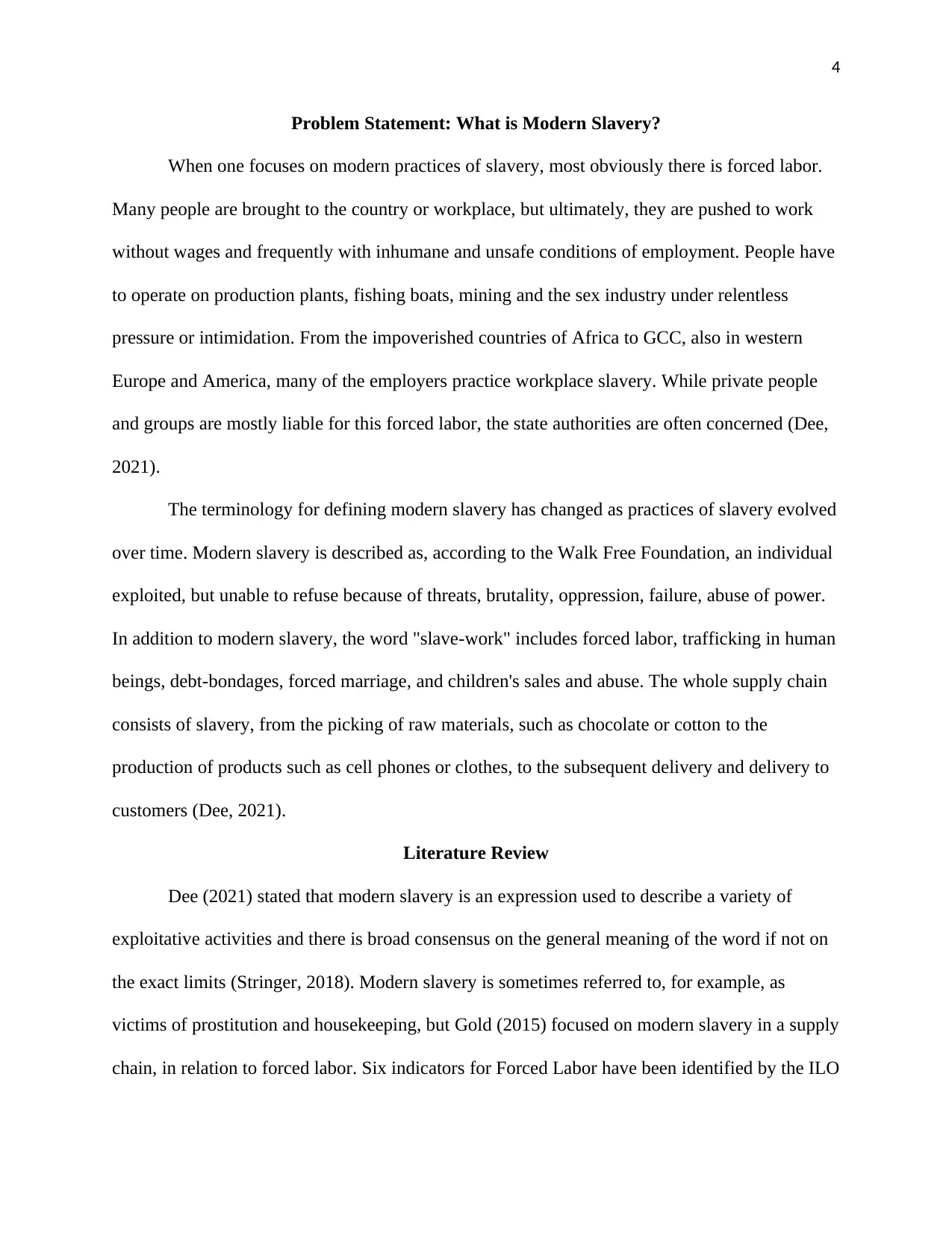
4
Problem Statement: What is Modern Slavery?
When one focuses on modern practices of slavery, most obviously there is forced labor.
Many people are brought to the country or workplace, but ultimately, they are pushed to work
without wages and frequently with inhumane and unsafe conditions of employment. People have
to operate on production plants, fishing boats, mining and the sex industry under relentless
pressure or intimidation. From the impoverished countries of Africa to GCC, also in western
Europe and America, many of the employers practice workplace slavery. While private people
and groups are mostly liable for this forced labor, the state authorities are often concerned (Dee,
2021).
The terminology for defining modern slavery has changed as practices of slavery evolved
over time. Modern slavery is described as, according to the Walk Free Foundation, an individual
exploited, but unable to refuse because of threats, brutality, oppression, failure, abuse of power.
In addition to modern slavery, the word "slave-work" includes forced labor, trafficking in human
beings, debt-bondages, forced marriage, and children's sales and abuse. The whole supply chain
consists of slavery, from the picking of raw materials, such as chocolate or cotton to the
production of products such as cell phones or clothes, to the subsequent delivery and delivery to
customers (Dee, 2021).
Literature Review
Dee (2021) stated that modern slavery is an expression used to describe a variety of
exploitative activities and there is broad consensus on the general meaning of the word if not on
the exact limits (Stringer, 2018). Modern slavery is sometimes referred to, for example, as
victims of prostitution and housekeeping, but Gold (2015) focused on modern slavery in a supply
chain, in relation to forced labor. Six indicators for Forced Labor have been identified by the ILO
Problem Statement: What is Modern Slavery?
When one focuses on modern practices of slavery, most obviously there is forced labor.
Many people are brought to the country or workplace, but ultimately, they are pushed to work
without wages and frequently with inhumane and unsafe conditions of employment. People have
to operate on production plants, fishing boats, mining and the sex industry under relentless
pressure or intimidation. From the impoverished countries of Africa to GCC, also in western
Europe and America, many of the employers practice workplace slavery. While private people
and groups are mostly liable for this forced labor, the state authorities are often concerned (Dee,
2021).
The terminology for defining modern slavery has changed as practices of slavery evolved
over time. Modern slavery is described as, according to the Walk Free Foundation, an individual
exploited, but unable to refuse because of threats, brutality, oppression, failure, abuse of power.
In addition to modern slavery, the word "slave-work" includes forced labor, trafficking in human
beings, debt-bondages, forced marriage, and children's sales and abuse. The whole supply chain
consists of slavery, from the picking of raw materials, such as chocolate or cotton to the
production of products such as cell phones or clothes, to the subsequent delivery and delivery to
customers (Dee, 2021).
Literature Review
Dee (2021) stated that modern slavery is an expression used to describe a variety of
exploitative activities and there is broad consensus on the general meaning of the word if not on
the exact limits (Stringer, 2018). Modern slavery is sometimes referred to, for example, as
victims of prostitution and housekeeping, but Gold (2015) focused on modern slavery in a supply
chain, in relation to forced labor. Six indicators for Forced Labor have been identified by the ILO
Paraphrase This Document
Need a fresh take? Get an instant paraphrase of this document with our AI Paraphraser
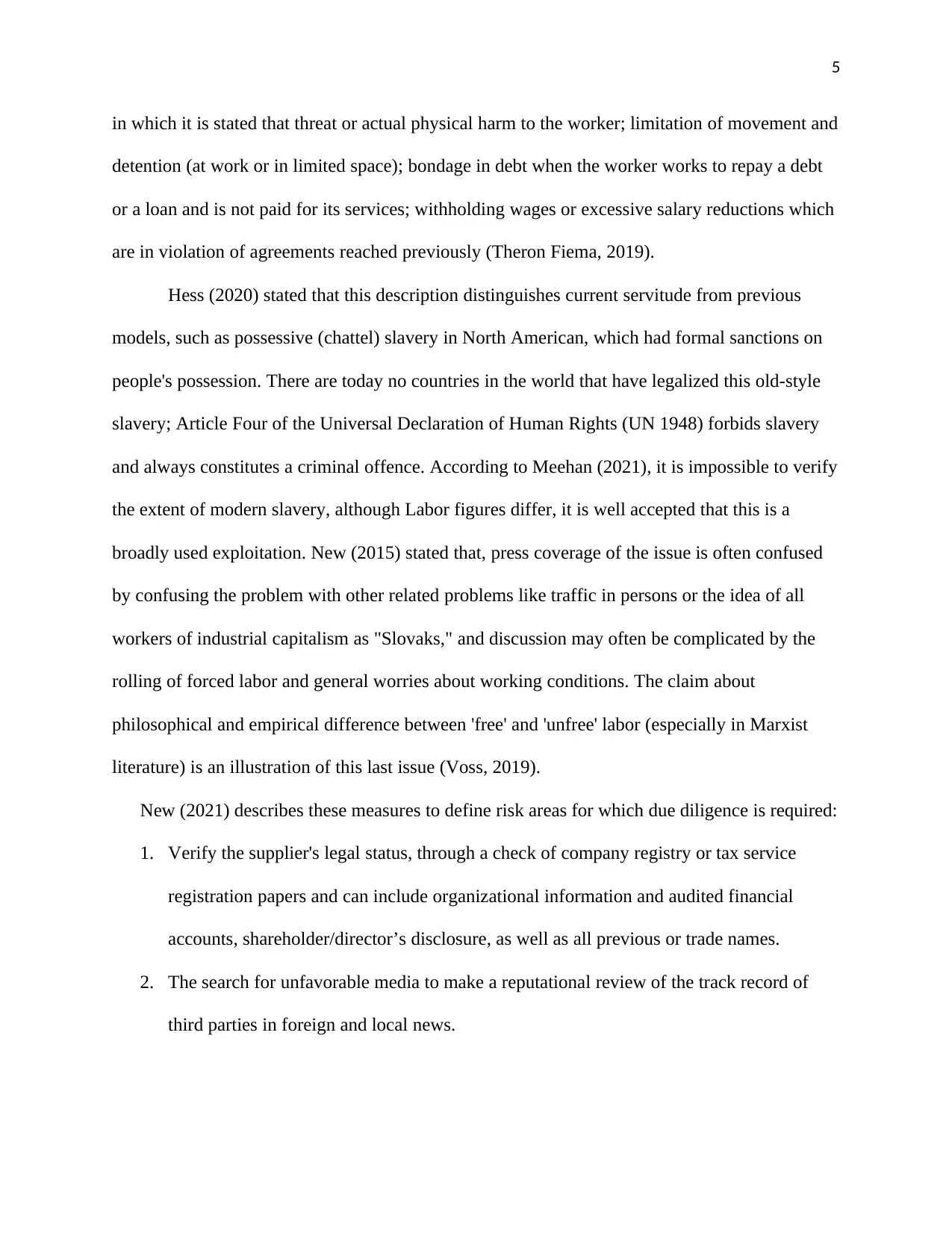
5
in which it is stated that threat or actual physical harm to the worker; limitation of movement and
detention (at work or in limited space); bondage in debt when the worker works to repay a debt
or a loan and is not paid for its services; withholding wages or excessive salary reductions which
are in violation of agreements reached previously (Theron Fiema, 2019).
Hess (2020) stated that this description distinguishes current servitude from previous
models, such as possessive (chattel) slavery in North American, which had formal sanctions on
people's possession. There are today no countries in the world that have legalized this old-style
slavery; Article Four of the Universal Declaration of Human Rights (UN 1948) forbids slavery
and always constitutes a criminal offence. According to Meehan (2021), it is impossible to verify
the extent of modern slavery, although Labor figures differ, it is well accepted that this is a
broadly used exploitation. New (2015) stated that, press coverage of the issue is often confused
by confusing the problem with other related problems like traffic in persons or the idea of all
workers of industrial capitalism as "Slovaks," and discussion may often be complicated by the
rolling of forced labor and general worries about working conditions. The claim about
philosophical and empirical difference between 'free' and 'unfree' labor (especially in Marxist
literature) is an illustration of this last issue (Voss, 2019).
New (2021) describes these measures to define risk areas for which due diligence is required:
1. Verify the supplier's legal status, through a check of company registry or tax service
registration papers and can include organizational information and audited financial
accounts, shareholder/director’s disclosure, as well as all previous or trade names.
2. The search for unfavorable media to make a reputational review of the track record of
third parties in foreign and local news.
in which it is stated that threat or actual physical harm to the worker; limitation of movement and
detention (at work or in limited space); bondage in debt when the worker works to repay a debt
or a loan and is not paid for its services; withholding wages or excessive salary reductions which
are in violation of agreements reached previously (Theron Fiema, 2019).
Hess (2020) stated that this description distinguishes current servitude from previous
models, such as possessive (chattel) slavery in North American, which had formal sanctions on
people's possession. There are today no countries in the world that have legalized this old-style
slavery; Article Four of the Universal Declaration of Human Rights (UN 1948) forbids slavery
and always constitutes a criminal offence. According to Meehan (2021), it is impossible to verify
the extent of modern slavery, although Labor figures differ, it is well accepted that this is a
broadly used exploitation. New (2015) stated that, press coverage of the issue is often confused
by confusing the problem with other related problems like traffic in persons or the idea of all
workers of industrial capitalism as "Slovaks," and discussion may often be complicated by the
rolling of forced labor and general worries about working conditions. The claim about
philosophical and empirical difference between 'free' and 'unfree' labor (especially in Marxist
literature) is an illustration of this last issue (Voss, 2019).
New (2021) describes these measures to define risk areas for which due diligence is required:
1. Verify the supplier's legal status, through a check of company registry or tax service
registration papers and can include organizational information and audited financial
accounts, shareholder/director’s disclosure, as well as all previous or trade names.
2. The search for unfavorable media to make a reputational review of the track record of
third parties in foreign and local news.
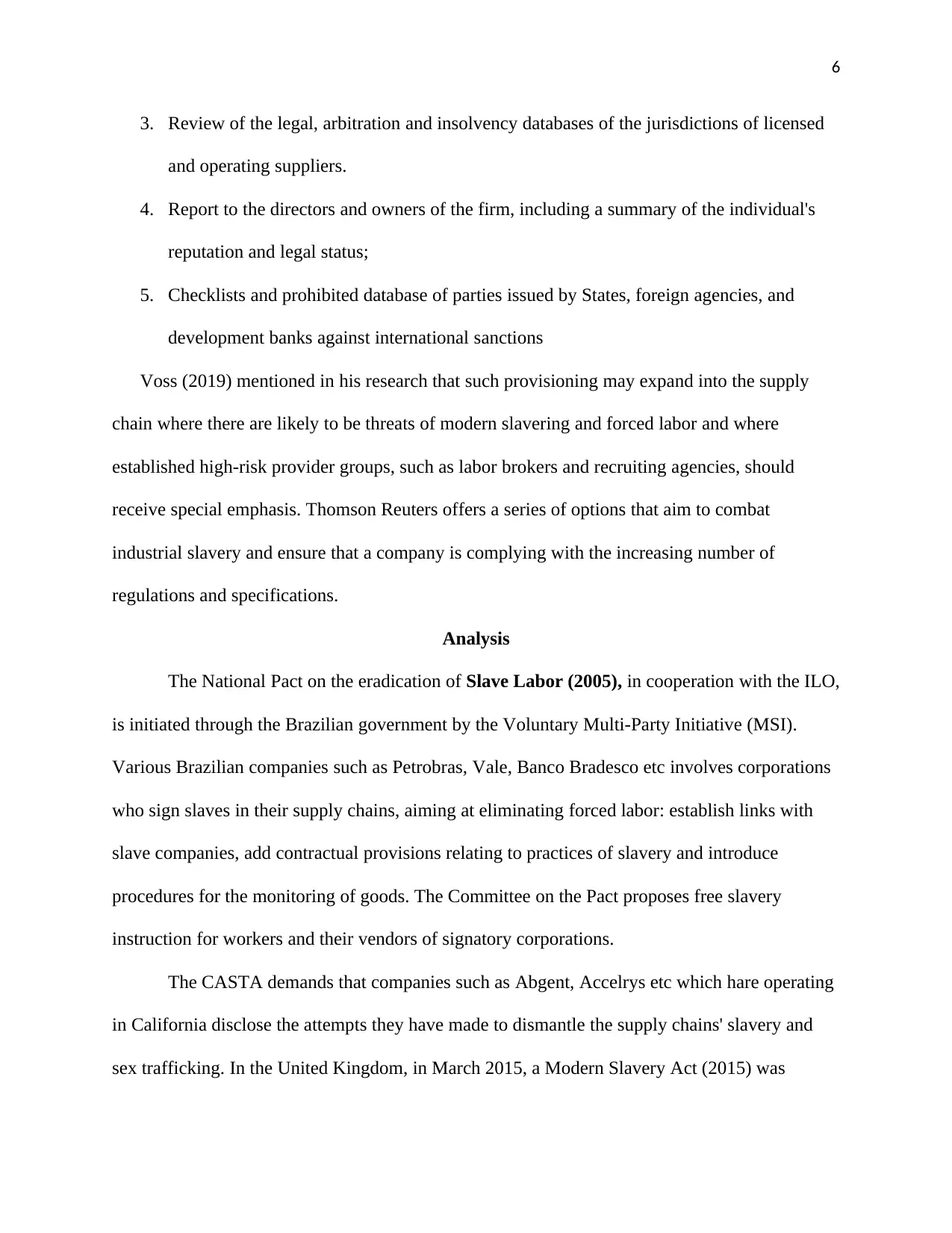
6
3. Review of the legal, arbitration and insolvency databases of the jurisdictions of licensed
and operating suppliers.
4. Report to the directors and owners of the firm, including a summary of the individual's
reputation and legal status;
5. Checklists and prohibited database of parties issued by States, foreign agencies, and
development banks against international sanctions
Voss (2019) mentioned in his research that such provisioning may expand into the supply
chain where there are likely to be threats of modern slavering and forced labor and where
established high-risk provider groups, such as labor brokers and recruiting agencies, should
receive special emphasis. Thomson Reuters offers a series of options that aim to combat
industrial slavery and ensure that a company is complying with the increasing number of
regulations and specifications.
Analysis
The National Pact on the eradication of Slave Labor (2005), in cooperation with the ILO,
is initiated through the Brazilian government by the Voluntary Multi-Party Initiative (MSI).
Various Brazilian companies such as Petrobras, Vale, Banco Bradesco etc involves corporations
who sign slaves in their supply chains, aiming at eliminating forced labor: establish links with
slave companies, add contractual provisions relating to practices of slavery and introduce
procedures for the monitoring of goods. The Committee on the Pact proposes free slavery
instruction for workers and their vendors of signatory corporations.
The CASTA demands that companies such as Abgent, Accelrys etc which hare operating
in California disclose the attempts they have made to dismantle the supply chains' slavery and
sex trafficking. In the United Kingdom, in March 2015, a Modern Slavery Act (2015) was
3. Review of the legal, arbitration and insolvency databases of the jurisdictions of licensed
and operating suppliers.
4. Report to the directors and owners of the firm, including a summary of the individual's
reputation and legal status;
5. Checklists and prohibited database of parties issued by States, foreign agencies, and
development banks against international sanctions
Voss (2019) mentioned in his research that such provisioning may expand into the supply
chain where there are likely to be threats of modern slavering and forced labor and where
established high-risk provider groups, such as labor brokers and recruiting agencies, should
receive special emphasis. Thomson Reuters offers a series of options that aim to combat
industrial slavery and ensure that a company is complying with the increasing number of
regulations and specifications.
Analysis
The National Pact on the eradication of Slave Labor (2005), in cooperation with the ILO,
is initiated through the Brazilian government by the Voluntary Multi-Party Initiative (MSI).
Various Brazilian companies such as Petrobras, Vale, Banco Bradesco etc involves corporations
who sign slaves in their supply chains, aiming at eliminating forced labor: establish links with
slave companies, add contractual provisions relating to practices of slavery and introduce
procedures for the monitoring of goods. The Committee on the Pact proposes free slavery
instruction for workers and their vendors of signatory corporations.
The CASTA demands that companies such as Abgent, Accelrys etc which hare operating
in California disclose the attempts they have made to dismantle the supply chains' slavery and
sex trafficking. In the United Kingdom, in March 2015, a Modern Slavery Act (2015) was
⊘ This is a preview!⊘
Do you want full access?
Subscribe today to unlock all pages.

Trusted by 1+ million students worldwide
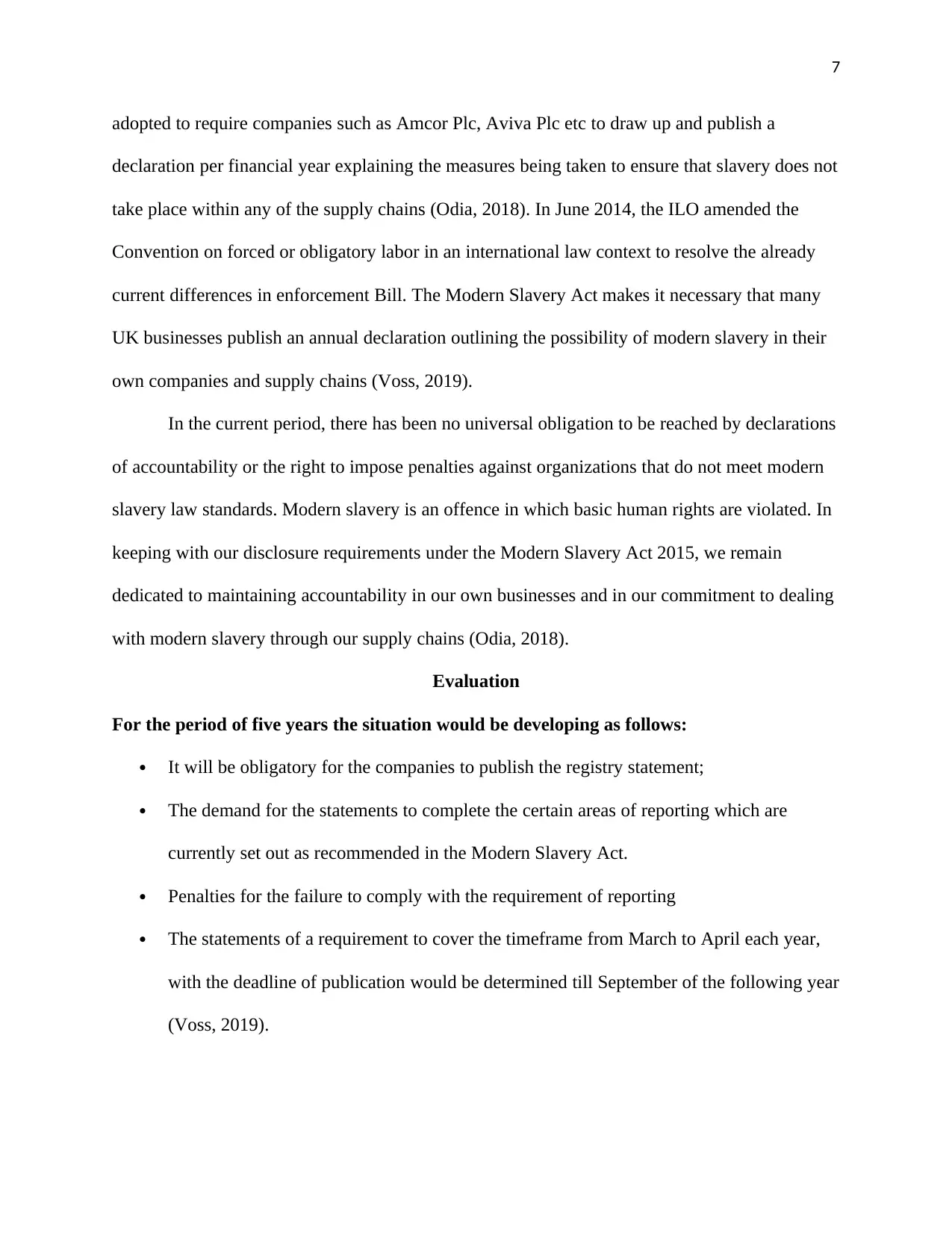
7
adopted to require companies such as Amcor Plc, Aviva Plc etc to draw up and publish a
declaration per financial year explaining the measures being taken to ensure that slavery does not
take place within any of the supply chains (Odia, 2018). In June 2014, the ILO amended the
Convention on forced or obligatory labor in an international law context to resolve the already
current differences in enforcement Bill. The Modern Slavery Act makes it necessary that many
UK businesses publish an annual declaration outlining the possibility of modern slavery in their
own companies and supply chains (Voss, 2019).
In the current period, there has been no universal obligation to be reached by declarations
of accountability or the right to impose penalties against organizations that do not meet modern
slavery law standards. Modern slavery is an offence in which basic human rights are violated. In
keeping with our disclosure requirements under the Modern Slavery Act 2015, we remain
dedicated to maintaining accountability in our own businesses and in our commitment to dealing
with modern slavery through our supply chains (Odia, 2018).
Evaluation
For the period of five years the situation would be developing as follows:
It will be obligatory for the companies to publish the registry statement;
The demand for the statements to complete the certain areas of reporting which are
currently set out as recommended in the Modern Slavery Act.
Penalties for the failure to comply with the requirement of reporting
The statements of a requirement to cover the timeframe from March to April each year,
with the deadline of publication would be determined till September of the following year
(Voss, 2019).
adopted to require companies such as Amcor Plc, Aviva Plc etc to draw up and publish a
declaration per financial year explaining the measures being taken to ensure that slavery does not
take place within any of the supply chains (Odia, 2018). In June 2014, the ILO amended the
Convention on forced or obligatory labor in an international law context to resolve the already
current differences in enforcement Bill. The Modern Slavery Act makes it necessary that many
UK businesses publish an annual declaration outlining the possibility of modern slavery in their
own companies and supply chains (Voss, 2019).
In the current period, there has been no universal obligation to be reached by declarations
of accountability or the right to impose penalties against organizations that do not meet modern
slavery law standards. Modern slavery is an offence in which basic human rights are violated. In
keeping with our disclosure requirements under the Modern Slavery Act 2015, we remain
dedicated to maintaining accountability in our own businesses and in our commitment to dealing
with modern slavery through our supply chains (Odia, 2018).
Evaluation
For the period of five years the situation would be developing as follows:
It will be obligatory for the companies to publish the registry statement;
The demand for the statements to complete the certain areas of reporting which are
currently set out as recommended in the Modern Slavery Act.
Penalties for the failure to comply with the requirement of reporting
The statements of a requirement to cover the timeframe from March to April each year,
with the deadline of publication would be determined till September of the following year
(Voss, 2019).
Paraphrase This Document
Need a fresh take? Get an instant paraphrase of this document with our AI Paraphraser
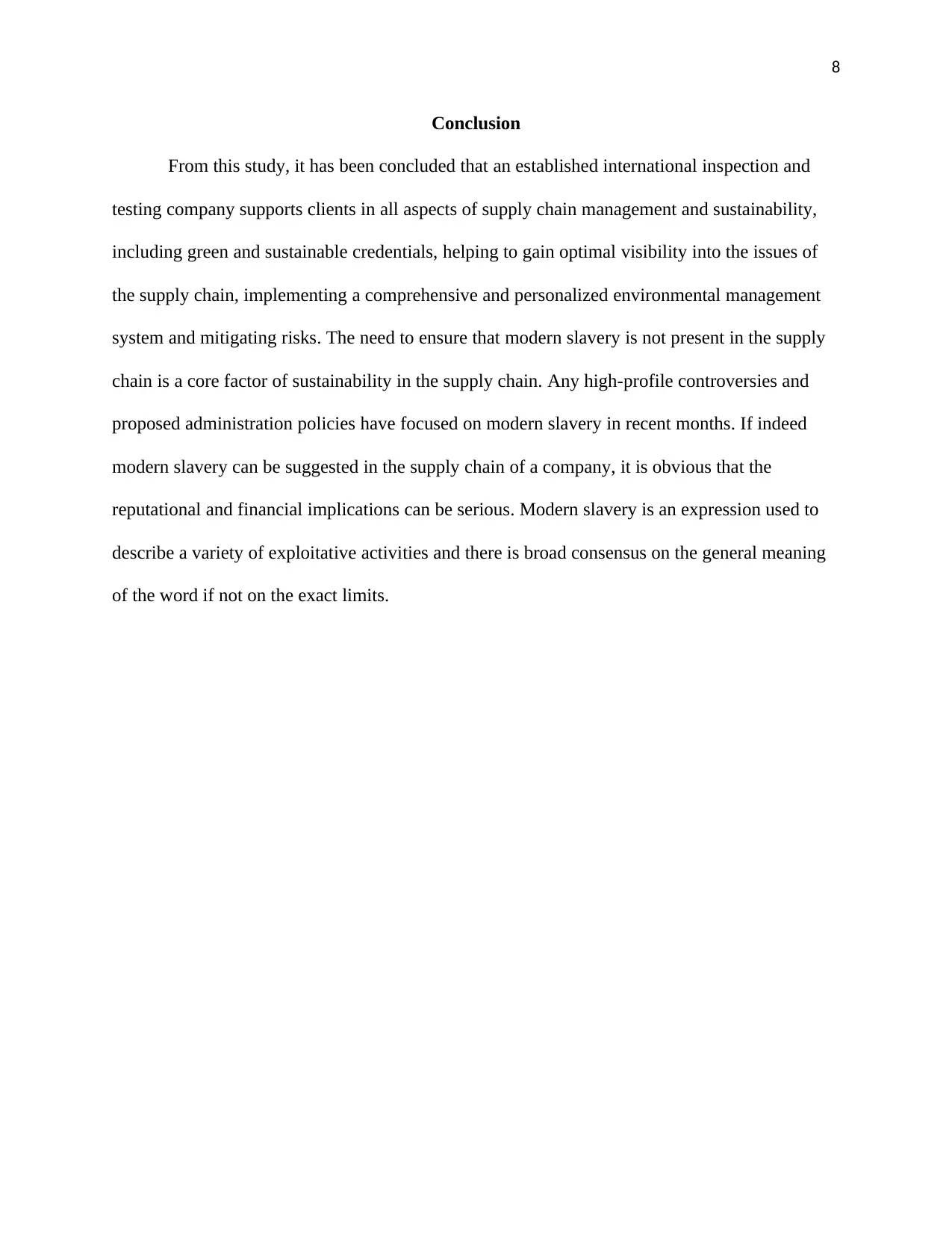
8
Conclusion
From this study, it has been concluded that an established international inspection and
testing company supports clients in all aspects of supply chain management and sustainability,
including green and sustainable credentials, helping to gain optimal visibility into the issues of
the supply chain, implementing a comprehensive and personalized environmental management
system and mitigating risks. The need to ensure that modern slavery is not present in the supply
chain is a core factor of sustainability in the supply chain. Any high-profile controversies and
proposed administration policies have focused on modern slavery in recent months. If indeed
modern slavery can be suggested in the supply chain of a company, it is obvious that the
reputational and financial implications can be serious. Modern slavery is an expression used to
describe a variety of exploitative activities and there is broad consensus on the general meaning
of the word if not on the exact limits.
Conclusion
From this study, it has been concluded that an established international inspection and
testing company supports clients in all aspects of supply chain management and sustainability,
including green and sustainable credentials, helping to gain optimal visibility into the issues of
the supply chain, implementing a comprehensive and personalized environmental management
system and mitigating risks. The need to ensure that modern slavery is not present in the supply
chain is a core factor of sustainability in the supply chain. Any high-profile controversies and
proposed administration policies have focused on modern slavery in recent months. If indeed
modern slavery can be suggested in the supply chain of a company, it is obvious that the
reputational and financial implications can be serious. Modern slavery is an expression used to
describe a variety of exploitative activities and there is broad consensus on the general meaning
of the word if not on the exact limits.
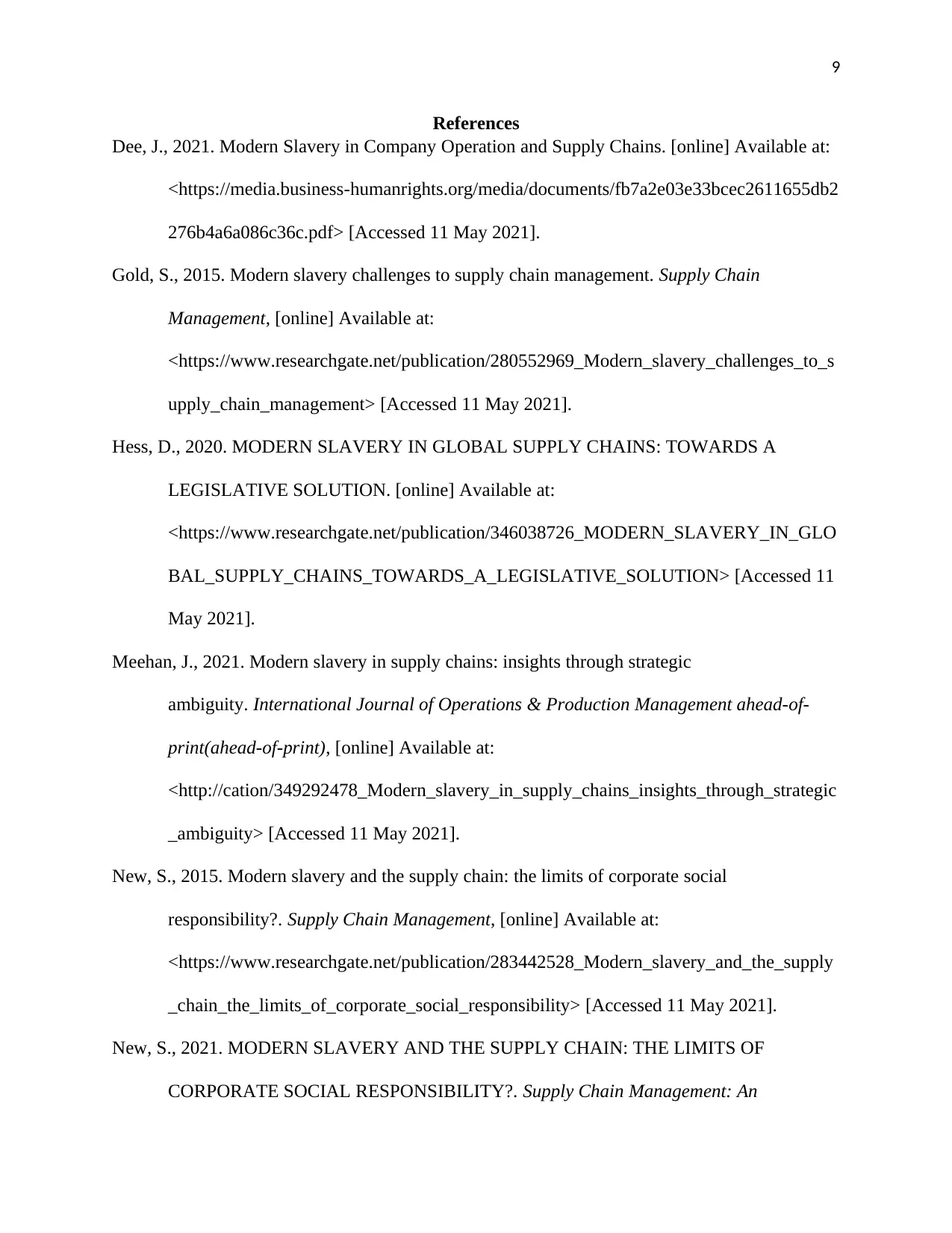
9
References
Dee, J., 2021. Modern Slavery in Company Operation and Supply Chains. [online] Available at:
<https://media.business-humanrights.org/media/documents/fb7a2e03e33bcec2611655db2
276b4a6a086c36c.pdf> [Accessed 11 May 2021].
Gold, S., 2015. Modern slavery challenges to supply chain management. Supply Chain
Management, [online] Available at:
<https://www.researchgate.net/publication/280552969_Modern_slavery_challenges_to_s
upply_chain_management> [Accessed 11 May 2021].
Hess, D., 2020. MODERN SLAVERY IN GLOBAL SUPPLY CHAINS: TOWARDS A
LEGISLATIVE SOLUTION. [online] Available at:
<https://www.researchgate.net/publication/346038726_MODERN_SLAVERY_IN_GLO
BAL_SUPPLY_CHAINS_TOWARDS_A_LEGISLATIVE_SOLUTION> [Accessed 11
May 2021].
Meehan, J., 2021. Modern slavery in supply chains: insights through strategic
ambiguity. International Journal of Operations & Production Management ahead-of-
print(ahead-of-print), [online] Available at:
<http://cation/349292478_Modern_slavery_in_supply_chains_insights_through_strategic
_ambiguity> [Accessed 11 May 2021].
New, S., 2015. Modern slavery and the supply chain: the limits of corporate social
responsibility?. Supply Chain Management, [online] Available at:
<https://www.researchgate.net/publication/283442528_Modern_slavery_and_the_supply
_chain_the_limits_of_corporate_social_responsibility> [Accessed 11 May 2021].
New, S., 2021. MODERN SLAVERY AND THE SUPPLY CHAIN: THE LIMITS OF
CORPORATE SOCIAL RESPONSIBILITY?. Supply Chain Management: An
References
Dee, J., 2021. Modern Slavery in Company Operation and Supply Chains. [online] Available at:
<https://media.business-humanrights.org/media/documents/fb7a2e03e33bcec2611655db2
276b4a6a086c36c.pdf> [Accessed 11 May 2021].
Gold, S., 2015. Modern slavery challenges to supply chain management. Supply Chain
Management, [online] Available at:
<https://www.researchgate.net/publication/280552969_Modern_slavery_challenges_to_s
upply_chain_management> [Accessed 11 May 2021].
Hess, D., 2020. MODERN SLAVERY IN GLOBAL SUPPLY CHAINS: TOWARDS A
LEGISLATIVE SOLUTION. [online] Available at:
<https://www.researchgate.net/publication/346038726_MODERN_SLAVERY_IN_GLO
BAL_SUPPLY_CHAINS_TOWARDS_A_LEGISLATIVE_SOLUTION> [Accessed 11
May 2021].
Meehan, J., 2021. Modern slavery in supply chains: insights through strategic
ambiguity. International Journal of Operations & Production Management ahead-of-
print(ahead-of-print), [online] Available at:
<http://cation/349292478_Modern_slavery_in_supply_chains_insights_through_strategic
_ambiguity> [Accessed 11 May 2021].
New, S., 2015. Modern slavery and the supply chain: the limits of corporate social
responsibility?. Supply Chain Management, [online] Available at:
<https://www.researchgate.net/publication/283442528_Modern_slavery_and_the_supply
_chain_the_limits_of_corporate_social_responsibility> [Accessed 11 May 2021].
New, S., 2021. MODERN SLAVERY AND THE SUPPLY CHAIN: THE LIMITS OF
CORPORATE SOCIAL RESPONSIBILITY?. Supply Chain Management: An
⊘ This is a preview!⊘
Do you want full access?
Subscribe today to unlock all pages.

Trusted by 1+ million students worldwide
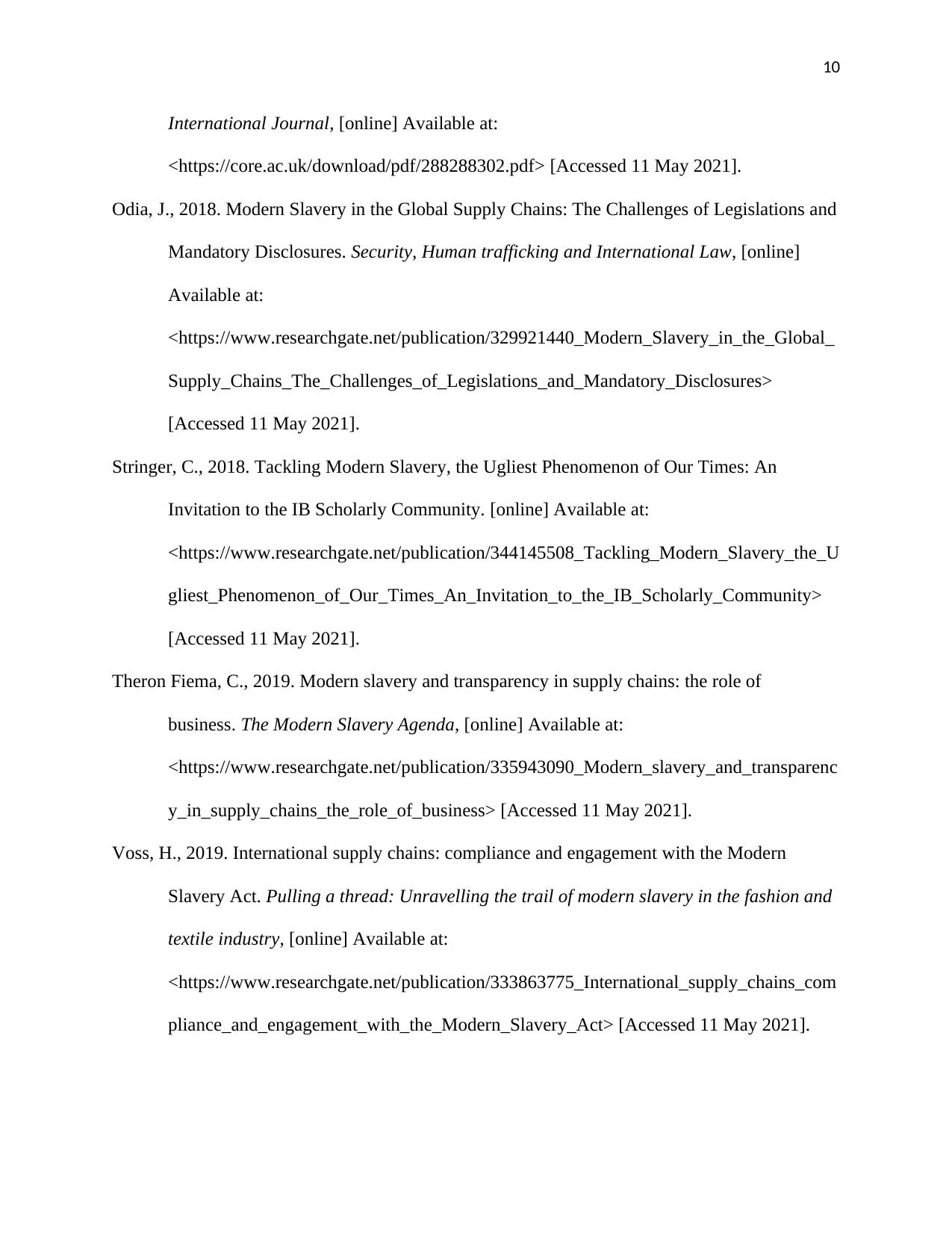
10
International Journal, [online] Available at:
<https://core.ac.uk/download/pdf/288288302.pdf> [Accessed 11 May 2021].
Odia, J., 2018. Modern Slavery in the Global Supply Chains: The Challenges of Legislations and
Mandatory Disclosures. Security, Human trafficking and International Law, [online]
Available at:
<https://www.researchgate.net/publication/329921440_Modern_Slavery_in_the_Global_
Supply_Chains_The_Challenges_of_Legislations_and_Mandatory_Disclosures>
[Accessed 11 May 2021].
Stringer, C., 2018. Tackling Modern Slavery, the Ugliest Phenomenon of Our Times: An
Invitation to the IB Scholarly Community. [online] Available at:
<https://www.researchgate.net/publication/344145508_Tackling_Modern_Slavery_the_U
gliest_Phenomenon_of_Our_Times_An_Invitation_to_the_IB_Scholarly_Community>
[Accessed 11 May 2021].
Theron Fiema, C., 2019. Modern slavery and transparency in supply chains: the role of
business. The Modern Slavery Agenda, [online] Available at:
<https://www.researchgate.net/publication/335943090_Modern_slavery_and_transparenc
y_in_supply_chains_the_role_of_business> [Accessed 11 May 2021].
Voss, H., 2019. International supply chains: compliance and engagement with the Modern
Slavery Act. Pulling a thread: Unravelling the trail of modern slavery in the fashion and
textile industry, [online] Available at:
<https://www.researchgate.net/publication/333863775_International_supply_chains_com
pliance_and_engagement_with_the_Modern_Slavery_Act> [Accessed 11 May 2021].
International Journal, [online] Available at:
<https://core.ac.uk/download/pdf/288288302.pdf> [Accessed 11 May 2021].
Odia, J., 2018. Modern Slavery in the Global Supply Chains: The Challenges of Legislations and
Mandatory Disclosures. Security, Human trafficking and International Law, [online]
Available at:
<https://www.researchgate.net/publication/329921440_Modern_Slavery_in_the_Global_
Supply_Chains_The_Challenges_of_Legislations_and_Mandatory_Disclosures>
[Accessed 11 May 2021].
Stringer, C., 2018. Tackling Modern Slavery, the Ugliest Phenomenon of Our Times: An
Invitation to the IB Scholarly Community. [online] Available at:
<https://www.researchgate.net/publication/344145508_Tackling_Modern_Slavery_the_U
gliest_Phenomenon_of_Our_Times_An_Invitation_to_the_IB_Scholarly_Community>
[Accessed 11 May 2021].
Theron Fiema, C., 2019. Modern slavery and transparency in supply chains: the role of
business. The Modern Slavery Agenda, [online] Available at:
<https://www.researchgate.net/publication/335943090_Modern_slavery_and_transparenc
y_in_supply_chains_the_role_of_business> [Accessed 11 May 2021].
Voss, H., 2019. International supply chains: compliance and engagement with the Modern
Slavery Act. Pulling a thread: Unravelling the trail of modern slavery in the fashion and
textile industry, [online] Available at:
<https://www.researchgate.net/publication/333863775_International_supply_chains_com
pliance_and_engagement_with_the_Modern_Slavery_Act> [Accessed 11 May 2021].
1 out of 10
Related Documents
Your All-in-One AI-Powered Toolkit for Academic Success.
+13062052269
info@desklib.com
Available 24*7 on WhatsApp / Email
![[object Object]](/_next/static/media/star-bottom.7253800d.svg)
Unlock your academic potential
Copyright © 2020–2026 A2Z Services. All Rights Reserved. Developed and managed by ZUCOL.





